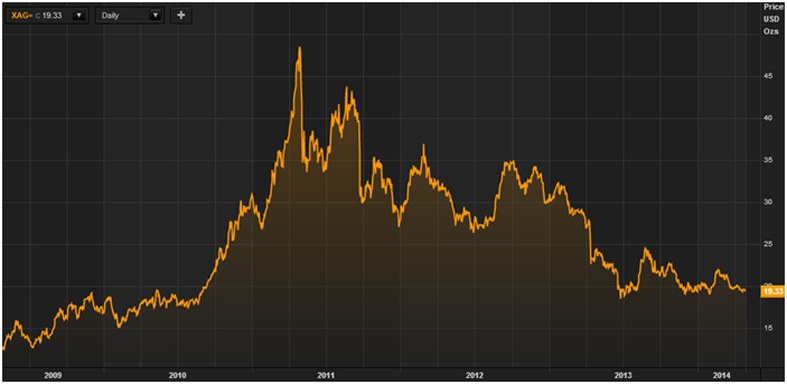- Today’s AM fix was USD 1,292.00, EUR 934.67 and GBP 768.32 per ounce.
- Yesterday’s AM fix was USD 1,289.75, EUR 930.02 and GBP 767.07 per ounce.
Gold fell $0.50, or 0.04%, yesterday to $1,296.10/oz. Silver slipped $0.10, or 0.51%, yesterday to $19.49/oz.
The gold price drifted lower overnight in Asian trading and settled just above the $1,290 level as markets await the conclusion of the U.S. Federal Reserve’s 2 day FOMC meeting later today. The Fed is expected to announce that it will continue its monthly tapering of bond purchases by another $10 billion this month, a move which would signal continued belief by the Fed in a U.S. economic recovery.
The gradual removal of monetary stimulus is viewed as negative for gold as it tenuously indicates that U.S. interest rates and economic activity may normalise over the medium term.
However, the gold price is continuing to be supported by ongoing geo-political tensions from Ukraine and Russia. Yesterday, the EU joined the U.S. in introducing further economic sanctions against various Russian companies and persons, a move which Putin vowed to retaliate against.

Deutsche Bank Departs London Fixings On May 13, 2104
German banking giant, Deutsche Bank, announced yesterday that it will be resigning from both the London Gold Fixing and London Silver Fixing panels, and that it is withdrawing without having found a buyer for either of its seats on the respective panels. According to informed sources, the Bank’s last day as a member of the Fixings is Tuesday, 13th May.
While Deutsche’s resignation was expected and there had been signs that it was struggling to find buyers, the news is noteworthy in that by giving only two weeks’ notice, the bank’s departure is now imminent, and the worst case fear for the other participants seems to have now been borne out, namely that prospective buyers of the seats have been frightened off by the growing regulatory investigations into the nature of the fixings and additionally, up to 20 commercial lawsuits which are alleging that the Fixing process is conducive to the manipulation of gold and silver prices.
When Deutsche departs, this will leave only four members, namely, Barclays, HSBC, Société Générale (SocGen) and Scotiabank, and only two members for the silver fixing, HSBC and Scotiabank. SocGen currently chairs the Gold Fixing, while the Silver Fixing is currently chaired by Scotiabank. The mechanics of the Fixing process are described here.
The gold and silver fixings are actually organised through UK limited liability companies of which the member investment bank traders are directors. There are five directors and five alternate directors of “The London Gold Market Fixing Limited” and three directors and three alternate directors of “The London Silver Market Fixing Limited”. When Deutsche resigns from the two companies, it is actually Deutsche’s director and alternate director to the two companies who will be resigning, namely Matthew Keen and James Vorley.
The Fixings are conducted twice daily at 10am and 3.30pm London time and are used widely by all participants in the precious metals industry for benchmarking prices and valuations and also as trading price reference points. In fact, the prices that GoldCore quotes each morning in our daily commentaries are the London fixing prices.
Earlier this year on 16th January, German financial regulator BaFin stated that possible manipulation of currency and precious metals markets could be more serious than the manipulation that has already been proven in the Libor rigging scandal. Interestingly, the next day on 17th January, Deutsche Bank announced that it was withdrawing from both the gold and silver fixings in what it called “a scaling back of its commodities business”.
It was then thought that Deutsche would sell its two seats to other investment bank buyers, the expectation for the gold seat was that Standard Bank of South Africa would acquire it, especially since Standard has recently agreed to sell 60% of its global markets division to Chinese banking giant ICBC, which would have given ICBC a ready-made route into the London gold market.
UK financial regulator, the Financial Conduct Authority (FCA), has also been adding to anxiety for the fixing banks, as it was reported last week that the FCA recently visited SocGen’s offices in London to sit in on the Fixing calls with SocGen’s precious metals traders, and that it intends to make similar visits to the trading floors of other fixing members.
Officially, Deutsche stated yesterday that it did not sell its seat in the gold fixing due to a lack of agreement on terms, but given that the last seat at the gold fixing to be sold was by NM Rothschild to Barclays in 2004 for somewhere in the region of £1 million, this type of price level would not seem to be an obstacle for a large investment bank buyer.
Over the last few months, there does not appear to have been any buying interest whatsoever in Deutsche’s silver seat, which begs the question, will the demise of the Silver Fixing come first and would this in turn undermine the rationale for retaining the Gold Fixing?
Now that there are significant regulatory and litigation spotlights on the Fixings, there is a real possibility that it may signal the beginning of the end for this historic price discovery process.
How this would affect gold and silver prices is not known, however, if there is found to be any basis to the price manipulation allegations, the removal of such manipulation would be expected to allow gold and silver prices to move to higher, to more natural price levels.